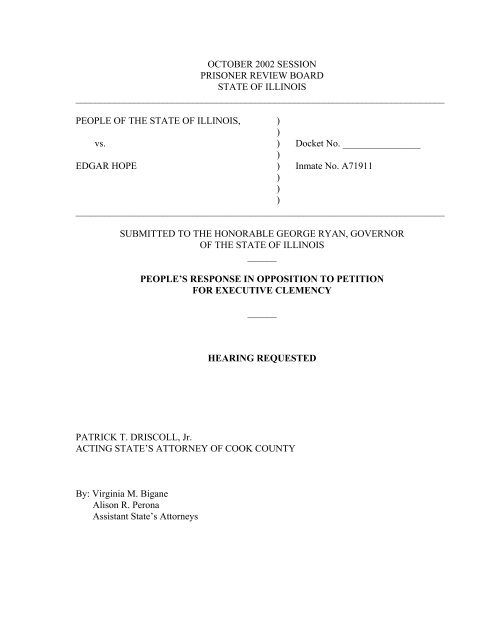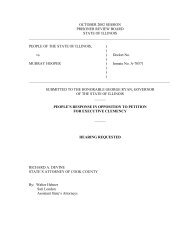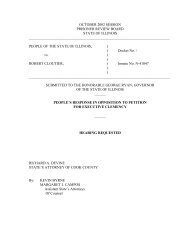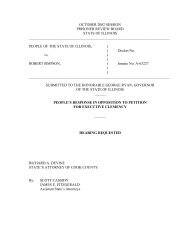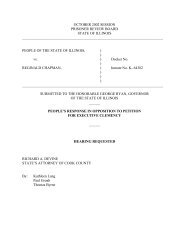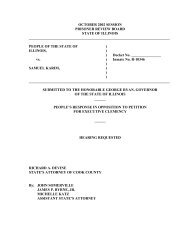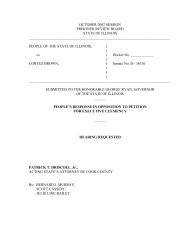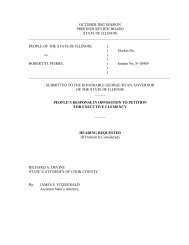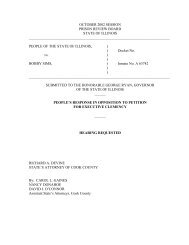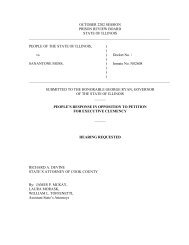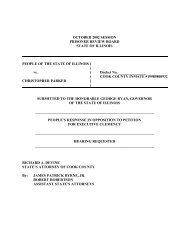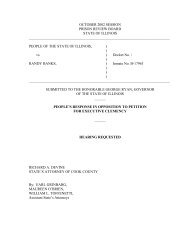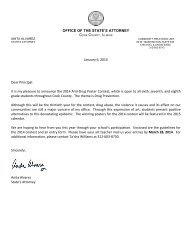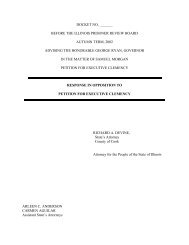Edgar Hope, Jr. - Cook County State's Attorney
Edgar Hope, Jr. - Cook County State's Attorney
Edgar Hope, Jr. - Cook County State's Attorney
Create successful ePaper yourself
Turn your PDF publications into a flip-book with our unique Google optimized e-Paper software.
Miraculously, Mr. Thompson survived Petitioner’s vicious attack. Mr. Wycliffe, however, didnot. The autopsy revealed that Lloyd Wycliffe was killed by a gunshot wound to his right chest.The gunshot had blown apart the upper portion of his heart and caused massive bleeding into hischest cavity.Petitioner remained at large for these crimes until his subsequent murderous crime spree.(See Section B, below.) Petitioner has been convicted of these crimes, given a capital sentenceand now contends, audaciously, that that sentence should be commuted.B.Petitioner’s second murder occurred less than a month after the McDonald’s shooting. Onthe night of February 5, 1982, <strong>Edgar</strong> <strong>Hope</strong> murdered uniformed Chicago Police Officer JamesDoyle on a crowded CTA bus. In this shooting spree, Petitioner also shot two unarmedcivilians who were passengers on the bus and attempted to kill Officer Doyle’s partner, RobertMantia. No one disputes Petitioner’s guilt as to these heinous acts, including Petitioner.He has pled guilty to each and every one of these crimes.The undisputed facts surrounding Petitioner’s murder of Officer Doyle are as follows:Rookie police officer James Doyle and his partner Robert Mantia were on routine patrol in thearea of 79 th and State on Chicago’s south side. Charles Harris approached their marked vehicleand told the officers that he recognized a man on a bus as being the person who had recentlyrobbed him. Harris told the officers that there was a warrant out for Petitioner’s arrest and thatthey should be careful because he believed that <strong>Hope</strong> was armed. The officers curbed the busat 79 th and LaFayette.The officers then exited their car and entered the bus. Officer Mantia walked down thepassenger side of the bus with Mr. Harris while Officer Doyle stayed at the front door. As theyapproached the rear of the bus, Harris pointed to a man seated in a side seat just beyond the reardoor as the wanted offender. That man was Petitioner <strong>Edgar</strong> <strong>Hope</strong>.Officer Mantia made eye contact with Petitioner and then returned to the front of the bus.He told Officer Doyle where the suspect was located and what he was wearing. The officersre-boarded the bus, with Officer Doyle going first. They walked toward the rear of the bus.Officer Doyle was wearing gloves but otherwise had nothing in his hands. Officer Mantia hadunholstered his gun and was carrying it down at his side. As they approached the rear of thebus, Officer Mantia saw movement between Petitioner and the man sitting next to him. OfficerDoyle approached <strong>Hope</strong> and asked him to stand. Petitioner eventually stood and asked whatwas the matter and stated that he had not done anything. Officer Mantia had positioned himselfto the rear of Petitioner and Officer Doyle, so that he could watch over the person sitting nextto Petitioner. As Officer Doyle was patting down Petitioner, Officer Mantia observed <strong>Hope</strong>reach into his left coat pocket and remove what he described as a dope kit. After looking at thekit, Officer Doyle replaced it in Petitioner’s pocket, took him by the arm, and told him to exitthe bus. Tragically, Officer Doyle failed to find either of the two handguns that Petitioner had2
again incarcerated at Menard from June 25, 1983 thru March 23, 1987, during whichtime he incurred twenty-eight (28) disciplinary infractions, including two weaponscharges. A round, sharpened 10” board was found in Petitioner ’s typewriter. A 3” nail wasfound in his bed. On another occasion, Petitioner threw a cup full of urine at the warden andtwo officers, splashing them in the face and eyes. (See Attachment A.)COOK COUNTY DEPARTMENT OF CORRECTIONSDuring Petitioner’s various times of incarceration in the <strong>Cook</strong> <strong>County</strong> Department ofCorrections, his violent nature continued to manifest itself.Phillip Hardiman is the former Executive Director of the <strong>Cook</strong> <strong>County</strong> Department ofCorrections. He has previously testified Petitioner was housed in the increased maximumsecuritysection of the jail in the early 1980s. Petitioner had a number of infractions whileincarcerated, including setting his cell on fire, being in possession of a shank, and threateningthe life of one of the wardens. Other problems with Petitioner involved getting him to andfrom court. He refused to dress for court and would not cooperate with the staff. In fact,Petitioner would threaten the staff.<strong>Cook</strong> <strong>County</strong> Correctional Officer Sylvester Jackson was present when Petitioner got intoan argument with some commissary workers when they refused to serve him. Officer Jacksontold Petitioner he would have to leave. Petitioner stepped into the hallway but refused to returnto his cell, saying that Officer Jackson would have to call a captain. Officer Jackson askedPetitioner to move, but again <strong>Hope</strong> refused. When Officer Jackson took Petitioner by the arm,Petitioner broke loose, smiled and then threw a punch at Officer Jackson, who ducked. OfficerJackson then had to subdue Petitioner.Lieutenant Ronald Clark of the <strong>Cook</strong> <strong>County</strong> Department of Corrections stated thatPetitioner was involved in a fight with another inmate on June 15, 1986, for which Petitionerreceived three days in the disciplinary cell. On March 9, 1987, Petitioner again received threedays in the disciplinary cell when he threw a bucket of water weighing 30 pounds at an officerand challenged him to a fight. A seven (7) inch shank was found in Petitioner’s cell on October20, 1988.Sergeant Mattie McLendon of the <strong>County</strong> Jail stated that on December 6, 1989, officerswere talking to Jerome Freeman, a high-ranking member of the Disciples, when Petitionerwalked up and asked why they were bothering his “leader.” Petitioner had to be restrained bythe officers and yelled, “What the fuck are you doing to my chief?” Petitioner received five (5)days segregation for this incident.As recently as March 7, 2000, in the <strong>Cook</strong> <strong>County</strong> Department of Corrections, Division 1,Petitioner was instructed by Officer Darnez Perkins that it was time to return from the dayroomto his cell in the segregated area. Petitioner refused and became verbally abusive. Officer5
Perkins then attempted to restrain Petitioner, at which time Petitioner viciously bit him in thearm.PETITIONER’S IN-COURT BAD ACTSEVEN THE SANCTITY OF A COURTROOM CANNOT QUELL PETITIONER HOPE’SVIOLENT AND UNPROVOKED BEHAVIORDuring petitioner’s trial in October, 1982, on the Officer Doyle murder, he repeatedlygestured at Officer Doyle’s partner, Officer Robert Mantia, in a threatening manner bypretending that he had a gun, pointing it at him, and firing.In May, 1993, tired of his public defender, Kevin Peters, Petitioner attacked Mr. Peters in anunprovoked manner when he “sucker-punched” him in open court directly in front of the judge.Petitioner had to be subdued by Chicago Police Officer Paul Sarpalius who was present in thecourtroom on an unrelated manner. Mr. Peters sustained significant injury to his mouth.On May 10, 1995, during jury selection in Judge Michael Buckley Bolan’s courtroom,Petitioner became irate in the lock-up—screaming vulgarities and posing a threat to thedeputies.VICTIM IMPACTPetitioner <strong>Hope</strong> left Alvin Thompson, the surviving McDonald’s victim, with nerve damagein his left wrist that extends to the thumb and palm area of the hand. Emotionally, Mr.Thompson suffered nightmares following the attack, underwent psychological counseling fordepression, and endured the dissolution of his marriage.Petitioner <strong>Hope</strong> left Vernitta Wycliffe without a husband and without a father for their threeyoung children. Mrs. Wycliffe has stated that she lost her “very best friend.”Petitioner <strong>Hope</strong> left Mary Jo Doyle Berkery without her only sibling. Mrs. Berkery hasstated that, for all intents and purposes, her mother died the same day that her brother did. Inreality, Mrs. Doyle passed away not long after her only son’s murder, dying of, what Mary Jodescribes as, “a broken heart.” Mary Jo’s only son Patrick, now 28, still misses his “UncleJimmy.”Petitioner <strong>Hope</strong> will leave all of the People of the State of Illinois his latest victimsshould the Governor choose to grant this petition.IIIREASONS FOR DENYING THE PETITION6
<strong>Edgar</strong> <strong>Hope</strong> is a cold and calculated murderer. In his petition, he cites neithersubstantive legal issues nor well-supported factual claims to support his claim for relief. Heclaims neither hardship nor rehabilitation. Thus, there are legally, factually, morally, andemotionally insufficient grounds to grant clemency.EVIDENCE OF PETITIONER’S GUILT IS OVERWHELMINGTwo juries, twenty-four people, were separately convinced, beyond a reasonable doubt, ofPetitioner’s guilt of these crimes. Two unimpeached witnesses have consistently identifiedpetitioner as the murderer of Lloyd Wycliff and the would-be killer of Alvin Thompson:Alvin Thompson and Charles Trent. Both witnesses identified Petitioner in a line-up andmade more than seven independent in-court identifications of Petitioner. The IllinoisSupreme Court affirmed <strong>Hope</strong>’s conviction and death sentence based on this evidence.Petitioner’s statement that evidence of his innocence is “overwhelming” is whollyunsupported by either this Petition or the trial court records. Despite the fact that Petitioner hashad a post-conviction petition pending in the Circuit Court of <strong>Cook</strong> <strong>County</strong> for over two yearsalleging his “innocence,” he has yet to produce any evidence in court to support hisallegations. He prefers to hide behind rhetoric and manufactured sensationalism in order togarner support for his position. With these tactics, he avoids having his so-called “evidence”tested in the proper forum: a court of law.PETITIONER ENJOYED ADEQUATE PROCEDURAL SAFEGUARDSGovernor’s Commission RecommendationsPetitioner asserts that he is entitled to clemency because he did not receive the benefit of thechanges to the Illinois capital sentencing system that have recently been adopted, proposed orenacted. By relying upon a laundry list of new Supreme Court Rules, statutes and proposals fromthe Governor’s Commission on Capital Punishment that were not available at the time of his trial,petitioner claims that his trial (as well as that of every other capital defendant in Illinois) was bydefinition fundamentally unfair. However, the Illinois Supreme Court has expressly rejected theclaim “that every capital trial has been unreliable and that all appellate review has been haphazard”(People v. Hickey, ___ Ill. 2d ___, 2001 Ill. LEXIS 1080 at *57 (No. 87286 September 27, 2001)).Rather, the Court held that the additional safeguards included in its rules governing capital casesare not retroactively applicable because they “function solely as devices to further protect thoserights given to defendants by the federal and state constitutions” and that “[a] violation ofprocedures designed to secure constitutional rights should not be equated with a denial of thoseconstitutional rights.” Id. at *63, 64.Thus, the fact that the Court, the General Assembly and the Governor’s Commission haveendeavored to improve the process does not mean that an injustice would result simply because the7
ecent changes were not applied retroactively to petitioner’s case. Instead, a true injustice wouldonly result if it were reflexively determined that petitioner’s trial was fundamentally unfair withoutany examination of the proceedings themselves. It is telling, however, that petitioner has not evenattempted to demonstrate how the recent changes would have affected the outcome of theproceedings. Moreover, petitioner ignores the fact that every court which has examined theproceedings in his case determined that they were fundamentally fair and that he was not undulyprejudiced in any manner.It is telling, however, that the petitioner has not even made attempts to demonstrate how therecommendations of the Commission would have affected the outcome of the proceedings. This isespecially so as the petitioner was found eligible for the death penalty based upon an aggravatingfactor, multiple murders, which the governor’s Commission has specifically recommended beretained. Significantly, there is no issue as to Petitioner’s eligibility for the death penalty inthis case; Petitioner pled guilty to the second, qualifying murder—the murder of on-dutypolice officer James Doyle. Petitioner’s reliance on boilerplate rhetoric highlights the fact that hisindividual claims are without merit.Supreme Court RulesPetitioner asserts that he is entitled to clemency because the new Supreme Court Rulesgoverning capital cases were not available to him at his trial in 1990. However, the IllinoisSupreme Court has clearly held that the amendments to its rules are not retroactively applicable.Hickey, 2001 Ill. LEXIS 1080 at *65. Thus, there is no legal reason to grant clemency on thisbasis.Adequate FundingPetitioner asserts that he is entitled to clemency because he was denied adequate funding toinvestigate the case and/or to retain the necessary expert witnesses. However, despite the creationof the Capital Litigation Trust Fund, there is no indication that any capital defendant in Illinois,particularly those prosecuted in <strong>Cook</strong> <strong>County</strong> has ever been deprived of the necessary funds toinvestigate or retain appropriate experts. Rather, courts have denied various requests that aredeemed unreasonable or unnecessary, the same standard that applies for funds under the CapitalLitigation Trust Fund. 725 ILCS 124/15(c). The mere fact that the Capital Litigation Trust Fundwas not created until 2000 is irrelevant to <strong>Hope</strong>’s claims. More importantly, <strong>Hope</strong>’s petition istactically silent as to how his defense in 1990 was in any way impaired by a lack of funding. If, infact, there were any legitimate evidence that Petitioner’s defense was in any way impeded by lackof financial resources, it would be specifically alleged in his pleadings. Logically, therefore, thisallegation, like the others, is wholly without merit.HOPE’S PETITION DOES INJUSTICE TO THE INTEGRITY OF THE LEGAL SYSTEM<strong>Hope</strong>’s five page, double-spaced, spartan petition impugns the integrity of the criminaljustice system and makes a mockery of the commutation process. He attempts to minimize8
oth his criminality and his amoral character by omitting and understating relevant facts.These calculated omissions are attempts to mislead and misinform the Governor, the Board, themedia, and the Citizens of the State of Illinois as to the true nature of the facts and Petitioner’scharacter in the hope that such a false record will con the Governor into granting clemency to acold-blooded killer.Rather than give the Board or the Governor adequate facts and well-articulated issuessupported by substantive evidence in support of his petition, <strong>Hope</strong> prefers to couch his plea interms that quote and paraphrase the Governor’s own personal agenda:-<strong>Hope</strong> was “sentenced to death under a system of capital punishment that GovernorRyan and many others familiar with its operation have aptly described as deeply flawedand in need of repair.” (1)-<strong>Hope</strong>’s sentence “was imposed under a system that has been aptly characterized as‘broken’ and ‘fundamentally flawed.’” (4)Through such blatant appeals to the Governor’s personal motivations and prejudices, Petitionerwants the Governor to grant him the reprieve that the jury and the Illinois Supreme Court hasrepeatedly, and rightfully, denied him.PETITIONER DOES NOT WANT TO HAVE HIS CASE JUDGED UPON ITS OWNMERITS BECAUSE A DISPASSIONATE, WELL-INFORMED ANALYSIS WILLLEAD ANY NON-BIASED REVIEWER TO DENY HIS REQUEST FOR RELIEF.Rather than postulating personalized claims for relief, Petitioner largely relies upon genericarguments that have no demonstrable nexus to his situation. To this end, Petitioner incorporatesby reference a document that will purportedly detail the “flaws” of the criminal justice system thatare evidenced by the “record of capital punishment in Illinois.” To date, such a document has notbeen filed on behalf of any of those seeking commutation from this governor. We can onlyanticipate the nature and content of such a filing.By their very nature, “global” appeals are intended to generate emotional, rather than rational,reactions. By their very nature, “global” appeals deliberately obscure the unique facts and issuesof individual cases in favor of sweeping generalizations—oversimplifications whose relevancy istenuous at best.Thus, anticipating these “global” arguments, we urge this Governor to consider thisextraordinary remedy on a case-by-case basis. Just as the facts of each case and factors inaggravation and mitigation were unique to each defendant so too should be the reasons eachdefendant seeks commutation. “Global” appeals merit no legitimate consideration in a process thathistorically, and rightfully, relies on neutral, detached, and rational deliberation and should beignored. Blanket commutation, which ignores the facts of individual cases and bypassesappropriate, legitimate review, is the only hope a rightfully convicted, properly sentenced, coldbloodedkiller has to avoid full responsibility for his actions.9
CONCLUSIONFor all these reasons, the People of the State of Illinois respectfully request that this Board10
and Governor Ryan deny executive clemency to <strong>Edgar</strong> <strong>Hope</strong>.Respectfully submitted,Patrick M. Driscoll, <strong>Jr</strong>.Acting State’s <strong>Attorney</strong> of <strong>Cook</strong> <strong>County</strong>Virginia M. BiganeAssistant State’s <strong>Attorney</strong>Alison R. PeronaAssistant State’s <strong>Attorney</strong>11


